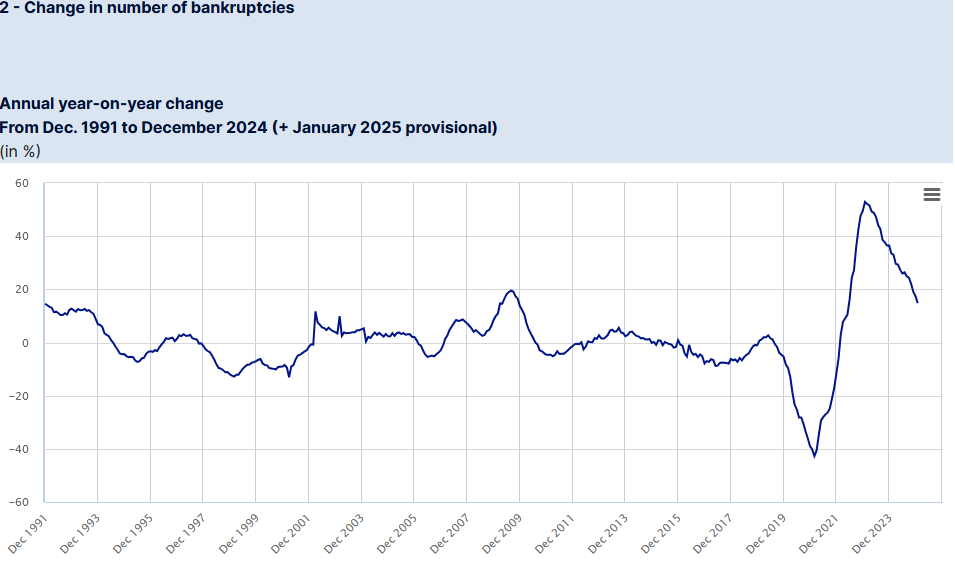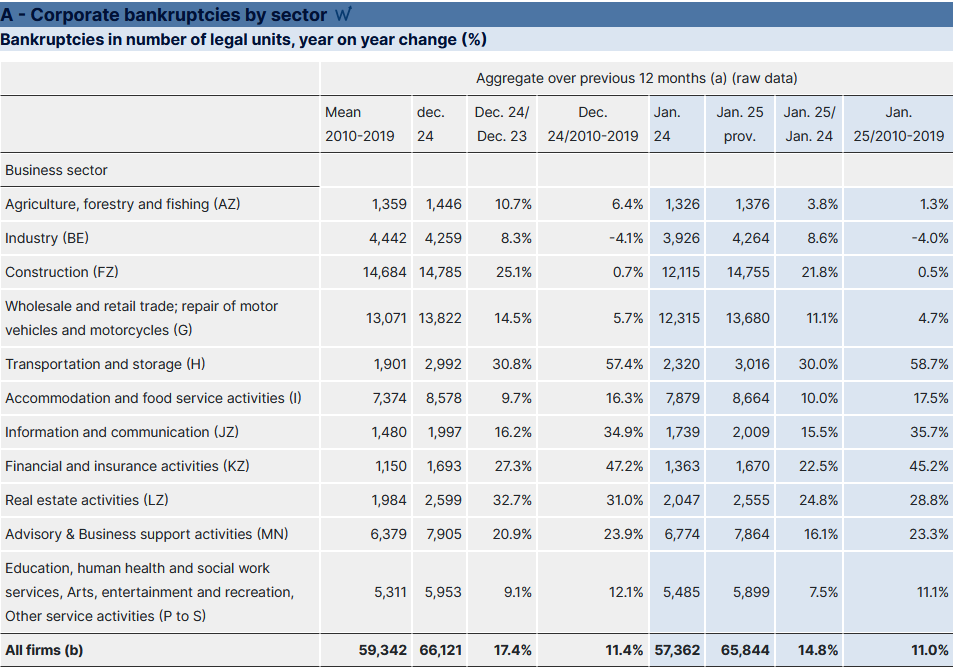 The report published by the Banque de France in February 2025 highlights a concerning trend: business failures continue to increase, with a 14.8% rise over the 12-month period ending in January.
The report published by the Banque de France in February 2025 highlights a concerning trend: business failures continue to increase, with a 14.8% rise over the 12-month period ending in January.
Although this upward trend has slightly slowed compared to December 2024, the number of failures remains above the pre-COVID average, reflecting an economy still under pressure. For Credit Management professionals, this development calls for heightened vigilance in managing customer risk.
A Rise Driven by Catch-Up Effects
In the past twelve months, 65,844 business failures were recorded by the end of January 2025 — a 14.8% increase compared to the previous year. This figure remains higher than the average observed between 2010 and 2019 (around 59,000), but still below the peaks seen during past economic crises. This increase is largely attributed to a catch-up effect following an exceptionally low number of failures in 2020 and 2021, due to the massive financial support provided during the pandemic (solidarity funds, government-backed loans, furlough schemes, etc.).

All Sectors Impacted — But to Varying Degrees
Business failures are increasing across all major sectors, but some are more exposed than others:
- Transport and storage: +30.0%
- Real estate: +24.8%
- Financial and insurance activities: +22.5%
- Retail and trade: +13.6%
- Hospitality and food services: +13.4%
- Manufacturing: +11.6%
In contrast, the increase is more moderate in sectors such as construction (+8.3%) and business services (+8.0%).

Which Company Sizes Are Most at Risk?
The data also shows that micro and small businesses continue to be the most vulnerable, while failures among large companies and mid-sized firms remain relatively stable:
- Microenterprises and unknown-size companies: 60,355 failures (+16.3%)
- Very small businesses: 3,319 failures (+19.9%)
- Small businesses: 1,520 failures (+24.8%)
- Medium-sized businesses: 505 failures (+34%)
- Mid-cap and large companies: stable figures, but still above pre-COVID levels
This trend highlights the importance of early support for small businesses facing cash flow, profitability, or financing challenges.
A Still Dynamic Business Landscape
Despite the rise in business failures, company creation remains strong. According to INSEE, 1.11 million businesses were created in France over the 12 months ending January 2025 — a 4% increase year-over-year. This dynamism reflects a resilient entrepreneurial spirit but should not overshadow the vulnerability of young businesses, often more exposed to difficulties in their early years.
Conclusion: Credit Management at the Heart of Financial Strategy
In an economic context marked by a sustained rise in business failures and ongoing uncertainty, companies must strengthen their approach to customer risk management more than ever. For finance departments and Credit Management teams, it's no longer just about monitoring indicators — but acting proactively. This involves three key pillars:
![]() Rigorous control of accounts receivable
Rigorous control of accounts receivable
![]() Proactive prevention of late payments
Proactive prevention of late payments
![]() Careful cash flow management
Careful cash flow management
With rising payment defaults and insolvency risks, the ability to strengthen collection processes, detect early warning signs, and implement an effective dunning strategy is now essential.
In a context of increasing defaults, relying on digital Credit Management solutions is crucial to anticipate risks, secure payments, and efficiently manage accounts receivable.
Need support to guide you through this process?
Anticipate risks, optimize cash collection, and improve operational efficiency with smart, digital Credit Management solutions. Contact our experts for an in-depth analysis and tailored recommendations for your B2B environment!